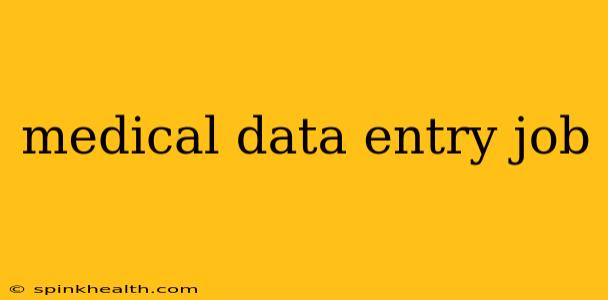The world of healthcare is constantly evolving, and with it, the need for skilled medical data entry professionals. This isn't just about typing; it's about accuracy, attention to detail, and a deep understanding of the importance of maintaining patient confidentiality. This guide will delve into the intricacies of a medical data entry job, exploring the role, requirements, and the rewarding aspects of this often-unsung career.
Imagine this: you're sitting at your computer, diligently transforming handwritten notes, lab results, and patient charts into neatly organized digital records. You're not just entering data; you're contributing to a crucial part of the healthcare system, ensuring that doctors, nurses, and other healthcare providers have the information they need to provide the best possible care. That's the essence of a medical data entry job.
What Does a Medical Data Entry Clerk Do?
A medical data entry clerk plays a vital role in the smooth operation of healthcare facilities. Their responsibilities often include:
- Entering patient data: This includes demographics, medical history, diagnoses, medications, allergies, and insurance information. Accuracy is paramount here, as even a small mistake can have significant consequences.
- Transcribing medical notes: This involves converting handwritten or dictated notes from physicians and other healthcare providers into electronic health records (EHRs). A strong understanding of medical terminology is essential.
- Processing lab results and other medical reports: This requires careful attention to detail and the ability to identify and flag any discrepancies or inconsistencies.
- Maintaining patient confidentiality: This is a critical aspect of the job, requiring strict adherence to HIPAA regulations and other privacy guidelines. Protecting patient information is of utmost importance.
- Data cleaning and verification: This involves ensuring the accuracy and completeness of the data, identifying and correcting errors, and standardizing data entry procedures.
- Maintaining organized records: Efficient filing and retrieval of electronic medical records is vital for easy access and quick response times.
What Skills Are Needed for Medical Data Entry Jobs?
The job is more than just typing fast; it demands a specific skillset:
- Typing skills: Speed and accuracy are essential for efficient data entry.
- Medical terminology: A strong understanding of medical terms and abbreviations is critical for accurate transcription and data entry.
- Attention to detail: Accuracy is paramount, as even a small error can have significant consequences.
- Data entry skills: Proficiency in using various data entry software and systems is crucial.
- Computer skills: Familiarity with computers, software, and electronic health records (EHRs) is essential.
- Organizational skills: The ability to maintain organized records and manage large amounts of data is vital.
- Confidentiality: Maintaining patient privacy and adhering to HIPAA regulations is paramount.
What are the Educational Requirements for a Medical Data Entry Job?
While a formal degree isn't always required, many employers prefer candidates with:
- High school diploma or GED: This is usually the minimum requirement.
- Medical terminology coursework: Formal training or online courses in medical terminology can significantly improve your chances.
- Data entry certification: Though not always mandatory, a certification demonstrates your commitment and competency.
How Much Does a Medical Data Entry Job Pay?
Salaries vary depending on location, experience, and employer. However, you can expect a competitive salary that allows for a comfortable living, with potential for growth and advancement within the healthcare industry.
Is Medical Data Entry a Good Career Path?
For those with an eye for detail and a passion for healthcare, a career in medical data entry can be highly rewarding. You’re contributing to the overall efficiency and accuracy of patient care, playing a crucial, behind-the-scenes role in the healthcare system. The stability of the healthcare industry offers long-term job security, and opportunities for advancement exist, potentially leading to roles with more responsibility and higher pay.
What are the Opportunities for Advancement in Medical Data Entry?
While starting as a data entry clerk, there are opportunities to grow your career. Some possibilities include:
- Senior medical data entry specialist: With experience, you can take on more responsibilities and potentially lead a team.
- Medical records technician: This involves more complex tasks, like analyzing data and improving data quality.
- Medical coder: This career requires additional training but can lead to higher earning potential.
The field of medical data entry is constantly evolving, requiring adaptation and continuous learning. However, the rewards of contributing directly to efficient and accurate healthcare are substantial. The path may start with diligent data entry, but the destination is a valuable contribution to patient care and a promising career within the healthcare sector.

